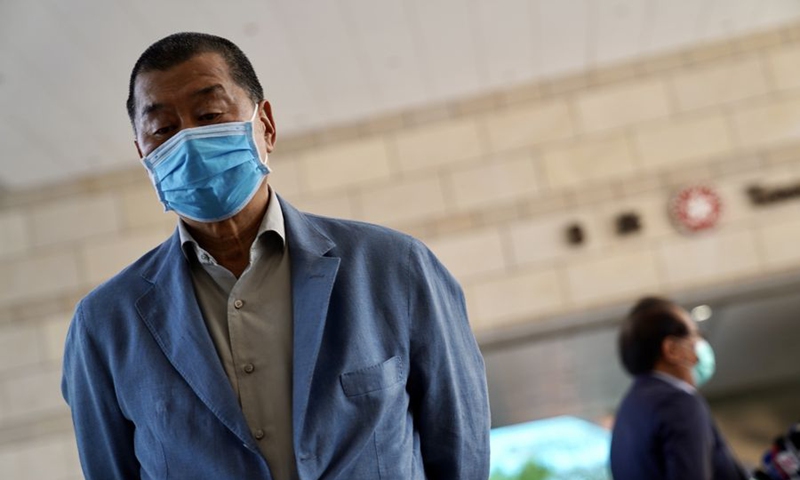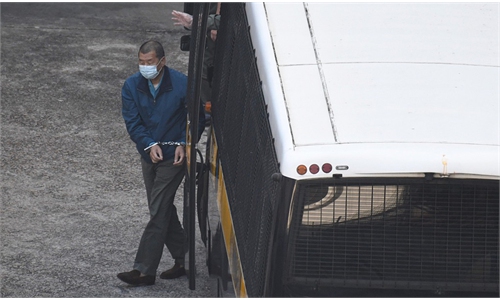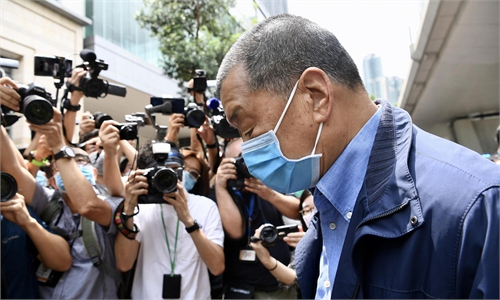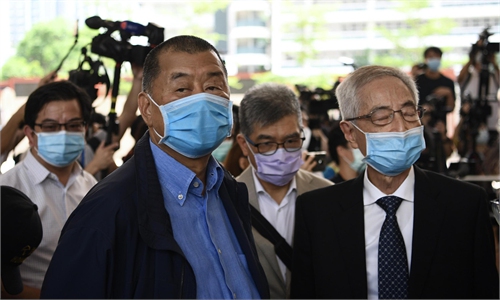Jimmy Lai denied bail in ‘landmark ruling signaling HK common law system adapting to national security law’

Photo taken on May 5, 2020 shows Jimmy Lai Chee-ying appearing in court on unauthorized assembly charge in Hong Kong, China. (Xinhua/Lui Siu Wai)
Hong Kong's top court denied bail on Tuesday for media tycoon and secessionist Jimmy Lai, who will stay behind bars until his trial on national security charges in April.
The latest ruling is a landmark move considered by legal experts as "symbolic" and having significant deterrence, showing that the common law system of Hong Kong is adapting its bail conditions to the national security law.
The Court of Final Appeal ruled on Tuesday in favor of the Department of Justice (DOJ), which had challenged Lai's bail decision granted by the Hong Kong High Court on December 23. The Court of Final Appeal, the city's highest judicial institution, revoked the bail order for Lai on December 31.
The bail hearing proceeded on February 1 without coming up with any ruling, and the Court of Final Appeal ruled in favor of the DOJ by revoking the bail order issued by the High Court on Tuesday.
Lai was formally charged under the national security law for Hong Kong for colluding with foreign forces to endanger national security on December 11, in what was widely seen as a high-profile case. The 73-year-old has been considered a "modern-day traitor" for his notorious acts and deeds in instigating one of the most violent and chaotic riots in the city in 2019.
"The latest ruling is symbolic, and also means the common law system of Hong Kong has finally applied 'prudent bail'principle under the national security law for Hong Kong," Tian Feilong, an associate professor at Beihang University in Beijing and member of the Beijing-based Chinese Association of Hong Kong and Macao Studies, told the Global Times on Tuesday.
Previously, some legal experts considered the case a landmark one as it was also deemed as a test of how Hong Kong's legal system interprets bail conditions under the national security law.
Article 42 of the national security law for Hong Kong states that no bail shall be granted to a criminal suspect or defendant unless the judge has sufficient grounds for believing that the criminal suspect or defendant will not continue to commit acts endangering national security.
The ruling on Lai's case is also seen as a major gauge of how to interpret Article 42 under the law, in other words, correctly understanding the national security law in context, some legal experts noted.
Lawrence Ma, a barrister and chairman of the Hong Kong Legal Exchange Foundation, told the Global Times Tuesday that the judge at the High Court failed to correctly interpret the new bail system set out for national security offences.
He believes that this final appeal court ruling will correct the erroneous view of the lower court, which previously thought that the bail system for national security offences was almost the same as for non-national security offences.
The final court held that the presumption of bail in other cases no longer applied to national security offences.
Ma said the final court's ruling opens up room for judges to inform and to alert themselves of the wider context of local political conflict and the suspect's role in the conflict so that they can process future national security law bail applications reasonably.
They can also refer to information gathered from social media platforms about the suspect to make their future factual findings on whether bail should be granted to such a suspect, said Ma.
Whether the national security law can be correctly and accurately interpreted and implemented is yet to be seen, because in Lai's case, even the High Court could go wrong and needed the Court of Final Appeal to redress its error, and no one can guarantee that the High Court will be right next time. But the latest ruling is a good start, according to the legal expert in Hong Kong.





